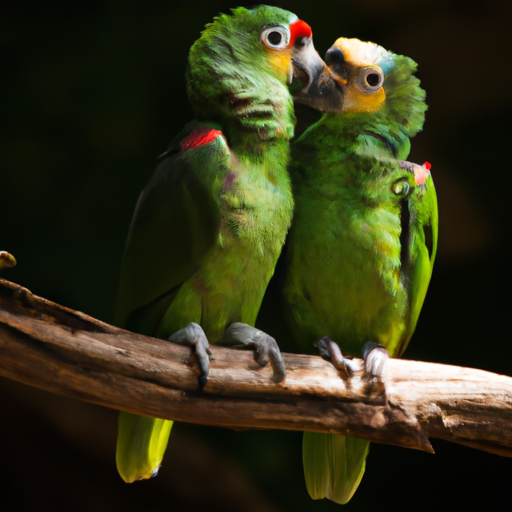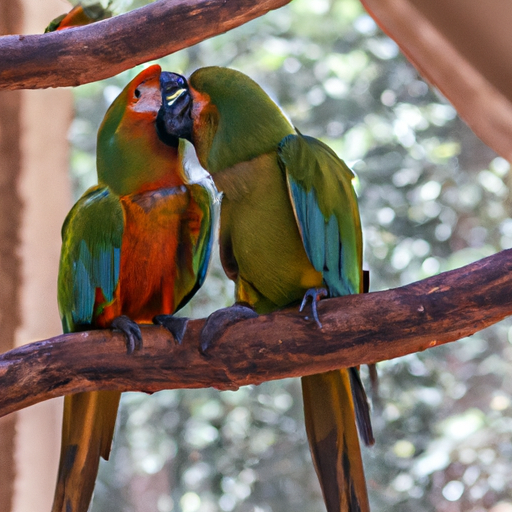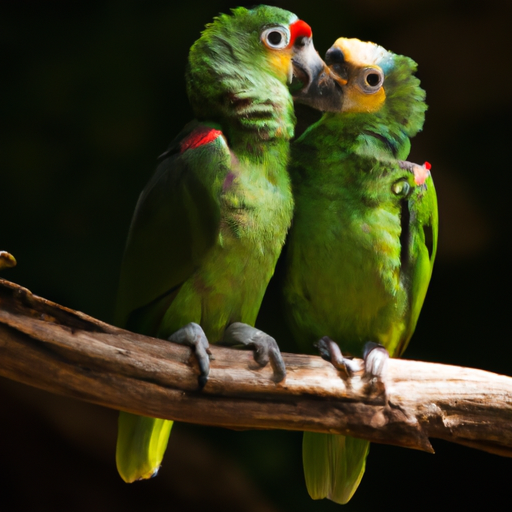Companion parrots are among the most vibrant and engaging pets one can have. They are known for their intelligence, playful nature, and ability to form strong bonds with their human caretakers. However, this bonding can sometimes lead to dependency, where the bird becomes overly reliant on its human companion for emotional support and social interaction. It’s crucial for the well-being of your feathered friend to strike a balance between a healthy bond and fostering independence. Here’s how you can achieve this balance.
Firstly, it’s important to understand the social needs of parrots. In the wild, parrots are social creatures, living in flocks and engaging in various activities that stimulate their physical and mental faculties. When we bring them into our homes, we must replicate this environment to the best of our abilities. This means providing them with opportunities for social interaction, mental stimulation, and physical activity, not just with humans but also with appropriate toys and, if possible, other birds.

Training and playtime are essential components in developing a healthy relationship with your parrot. Engaging in regular, structured play sessions helps establish clear communication channels between you and your bird. Use positive reinforcement techniques, such as treats and verbal praise, to reward good behavior. This not only strengthens your bond but also teaches your parrot desirable behaviors and tricks, keeping their mind sharp and engaged.
Encouraging foraging behavior is another vital aspect of reducing dependency. In the wild, a significant part of a parrot’s day is spent foraging for food. You can simulate this natural behavior by using foraging toys that require them to think and work to retrieve treats. These activities help keep your parrot mentally stimulated and physically active, reducing their reliance on you for entertainment.
Another key strategy is to encourage your parrot to spend time alone. Start by setting up a safe, comfortable space for your bird that includes various perches, toys, and feeding stations. Gradually increase the time your parrot spends in this area independently by leaving them with engaging activities. This practice helps them feel more secure when alone and lessens anxiety-related behaviors when you are not around.
Socialization with a variety of people is also crucial. Often, parrots can become overly attached to one person in the household, viewing them as their primary source of security and companionship. By exposing your parrot to different people under positive circumstances, you can help them become more adaptable and less anxious about social interactions without their primary caregiver. This exposure can be as simple as having different family members participate in feeding, playing, or training sessions.

Lastly, it’s important to recognize the signs of over-dependency in your parrot. These can include excessive screaming when you leave the room, feather plucking, or aggressive behavior when others approach you. If you notice these signs, it might be time to adjust your interaction patterns with your parrot and possibly consult with a veterinarian or an avian behaviorist.

Building a bond with your companion parrot while fostering their independence is a delicate balancing act. It requires patience, consistency, and an understanding of your parrot’s natural behaviors. By employing these strategies, you can enjoy a rewarding relationship with your parrot, one where they feel secure and stimulated, even in your absence. The joy of seeing your parrot happy and healthy, thriving with a perfect blend of companionship and independence, is truly unparalleled.


4 Comments
Wow, this is so insightful! I think this kind of balance is key in any pet and owner relationship. I will surely implement these tips with my parrot, Rio. Thank you for sharing your wisdom. 🦜👍🏼
Great post! I am a new parrot owner and was unsure about how to balance bonding and independence. Now, I feel much more confident. Keep these helpful articles coming! 😊🦜
This article was such a lifesaver! I’ve been struggling with my parrot’s clingy behavior for a while. The tips and tricks you’ve shared are definitely worth a try. Thanks a lot! 🦜💕
I can’t express how much I appreciate this post. It’s so important to establish a healthy bond with our feathered friends without encouraging dependency. Your advice will help many parrot parents out there. Kudos to you! 🙌🏼🦜